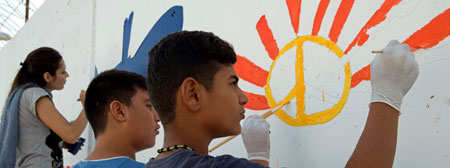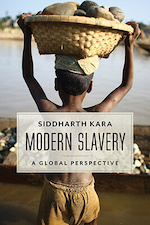
Human trafficking is a crime. To report in India, call Shakti Vahini
+91-11-42244224, +91-9582909025 or the national helpline Childline on 1098.
“As per a study on human trafficking, the state of Jharkhand has emerged as India’s trafficking hub with thousands of tribal women and girls being trafficked out of the state each year to Delhi, Punjab, Haryana and beyond [while] human traffickers are also involved in many cases of missing children.” – The Wire | Shakti Vahini | Tourism locations | Adivasi tribal bondage slavery trafficking (Safe search) >>

International Day of the World’s Indigenous People (9 August) >>
World Day Against Trafficking in Persons 30 July
The stories of human trafficking survivors illustrate the impact of survivor engagement and the need for victim empowerment – each story shows the motivation to engage in anti-trafficking efforts. Many victims of human trafficking have experienced ignorance or misunderstanding in their attempts to get help.| Learn more >>
Find up-to-date information provided by, for and about Indian authors, researchers, officials, and educators
List of web portals covered by the present Custom search engine
Ashoka Trust for Research in Ecology and the Environment (ATREE) – www.atree.org
Freedom United – www.freedomunited.org
Government of India (all websites ending on “.gov.in”)
Shodhganga (a reservoir of Indian theses) – https://shodhganga.inflibnet.ac.in
Survival International – www.survivalinternational.org
UCLA Digital Library – https://digital.library.ucla.edu
Unesco – https://en.unesco.org
Unesco digital library – https://unesdoc.unesco.org
Unicef – www.unicef.org
United Nations – www.un.org/en
Video Volunteers – www.videovolunteers.org
WorldCat (“the world’s largest library catalog, helping you find library materials online”) – https://worldcat.org
To search Indian periodicals, magazines, web portals and other sources safely, click here. To find publishing details for Shodhganga’s PhD search results, click here >>
Search tips
Combine the name of any particular state, language or region with that of any tribal (Adivasi) community.
Add keywords of special interest (music, poetry, dance just as health, sacred grove and biodiversity); learn about the rights of Scheduled Tribes such as the “Forest Rights Act” (FRA); and the United Nations “Declaration on the Rights of Indigenous Peoples”, “Universal Declaration of Human Rights”, “women’s rights”, or “children’s right to education”.
Specify any other issue or news item you want to learn more about (biodiversity, bonded labour and human trafficking, climate change, ecology, economic development, ethnobotany, ethnomedicine, global warming, hunter-gatherers in a particular region or state, prevention of rural poverty, water access).
For official figures include “scheduled tribe ST” along with a union state or region: e.g. “Chhattisgarh ST community”, “Himalayan tribe”, “Scheduled tribe Tamil Nadu census”, “ST Kerala census”, “Particularly Vulnerable Tribal Group Jharkhand”, “PVTG Rajasthan”, “Adivasi ST Kerala”, “Adibasi ST West Bengal” etc.
In case the Google Custom Search window is not displayed here try the following: (1) toggle between “Reader” and regular viewing; (2) in your browser’s Security settings select “Enable JavaScript” | More tips >>
Note: hyperlinks and quotes are meant for fact-checking and information purposes only | Disclaimer >>
[*] Some clarifications on caste-related issues by reputed scholars
Understanding “caste” in the context of Indian democracy: The “Poona Pact of 1932”
“Mahatma Gandhi and BR Ambedkar differed over how to address caste inequities through the electoral system. Their exchanges led to the Poona Pact of 1932, which shaped the reservation system in India’s electoral politics. […]
Two prominent figures who have significantly contributed to this discourse are Mahatma Gandhi, Father of the Nation, and Bhimrao Ramji Ambedkar, Father of the Constitution. The two stalwarts of Indian politics, while revered equally by the public, had contrasting views on the caste system. Their subsequent debates have shaped the course of Indian society and politics. While Gandhi denounced untouchability, he did not condemn the varna system, a social hierarchy based on occupation, for most of his life. He believed in reforming the caste system through the abolition of untouchability and by giving equal status to each occupation. On the other hand, BR Ambedkar, a Dalit himself, argued that the caste system disorganised and ‘demoralised Hindu society, reducing it to a collection of castes’. […]
And yet, despite their differences, they developed an understanding to work for the betterment of the marginalised.” – Rishabh Sharma in “How Ambedkar and Gandhi’s contrasting views paved way for caste reservation” (India Today, 6 October 2023)
URL: https://www.indiatoday.in/history-of-it/story/ambedkar-gandhi-caste-system-poona-pact-1932-reservation-2445208-2023-10-06
~ ~ ~
“That upper caste groups should declare themselves to be OBCs [Other Backward Castes] and want to avail of the reservation policy is a pandering to caste politics of course, as also are caste vote-banks. It is partially a reflection of the insecurity that the neo-liberal market economy has created among the middle-class. Opportunities are limited, jobs are scarce and so far ‘development’ remains a slogan. There’s a lot that is being done to keep caste going in spite of saying that we are trying to erode caste. We are, of course, dodging the real issue. It’s true that there has been a great deal of exploitation of Dalit groups and OBC’s in past history; making amends or even just claiming that we are a democracy based on social justice demands far more than just reservations. The solution lies in changing the quality of life of half the Indian population by giving them their right to food, water, education, health care, employment, and social justice. This, no government so far has been willing to do, because it means a radical change in governance and its priorities.” – Romila Thapar (Emeritus Professor of History, Jawaharlal Nehru University) interviewed by Nikhil Pandhi (Caravan Magazine, 7 October 2015)
URL: https://caravanmagazine.in/vantage/discipline-notion-particular-government-interview-romila-thapar
~ ~ ~
“Casteism is the investment in keeping the hierarchy as it is in order to maintain your own ranking, advantage, privilege, or to elevate yourself above others or keep others beneath you …. For this reason, many people—including those we might see as good and kind people—could be casteist, meaning invested in keeping the hierarchy as it is or content to do nothing to change it, but not racist in the classical sense, not active and openly hateful of this or that group.” – Book review by Dilip Mandal for Caste: The Origins of Our Discontents (The Print, 23 August 2020)
URL: https://theprint.in/opinion/oprah-winfrey-wilkerson-caste-100-us-ceos-indians-wont-talk-about-it/487143/
~ ~ ~
“The theoretical debate on caste among social scientists has receded into the background in recent years. [However] caste is in no sense disappearing: indeed, the present wave of neo-liberal policies in India, with privatisation of enterprises and education, has strengthened the importance of caste ties, as selection to posts and educational institutions is less based on merit through examinations, and increasingly on social contact as also on corruption. There is a tendency to assume that caste is as old as Indian civilization itself, but this assumption does not fit our historical knowledge. To be precise, however, we must distinguish between social stratification in general and caste as a specific form. […]
From the early modern period till today, then, caste has been an intrinsic feature of Indian society. It has been common to refer to this as the ‘caste system’. But it is debatable whether the term ‘system’ is appropriate here, unless we simply take for granted that any society is a ‘social system’. First, and this is quite clear when we look at the history of distinct castes, the ‘system’ and the place various groups occupy within it have been constantly changing. Second, no hierarchical order of castes has ever been universally accepted […] but what is certain is that there is no consensus on a single hierarchical order.” – Harald Tambs-Lyche (Professor Emeritus, Université de Picardie, Amiens) in “Caste: History and the Present” (Academia Letters, Article 1311, 2021), pp. 1-2
URL: https://www.academia.edu/49963457
~ ~ ~
“There is a need for intercultural education. We all need to work together to bridge these divides not only between religions and castes but also regions. It is not correct to think that one part is better than the other. Some of the limitations of India as a whole are due to our common heritage, say the one that has restricted women from having a flourishing life for themselves.” – Prof. V. Santhakumar (Azim Premji University) in “On the so called North-South Divide in India” (personal blog post in Economics in Action, 13 April 2024)
URL: https://vsanthakumar.wordpress.com/2024/04/13/on-the-so-called-north-south-divide-in-india/
“In his play Muktadhara (The Waterfall), Tagore robustly employs this element of freedom. The play relates the story of an exploited people and their eventual release from it. [Today, when] tribal populations across India are being uprooted with impudence Tagore’s message of freedom, in all its shades, is of utmost relevance.” – Bhaswati Ghosh in Freedom in Tagore’s Plays | Learn more >>
MODERN SLAVERY IN INDIA >>
Estimated number living in modern slavery: 11,050,000 (8.0 per thousand)
“Modern slavery takes many forms and is known by many names. Essentially, it refers to situations of exploitation that a person cannot refuse or leave because of threats, violence, coercion, or deception. […] Modern slavery is inextricably linked with global challenges such as climate degradation, gender inequality, COVID-19, and conflict. […] The adverse impacts of climate change magnify other drivers of displacement such as loss of livelihoods, poverty, food insecurity, and a lack of access to water and other resources, pushing people to migrate and exposing these vulnerable populations to modern slavery. […] An estimated 5.4 million children worldwide live in orphanages and other institutions.” – https://www.walkfree.org/global-slavery-index/ (Date accessed: 11 April 2024)
WOMEN AND GIRLS
Women and girls are disproportionately affected by modern slavery. As they transition through childhood, adolescence and adult life, the impacts of discrimination multiply and gender inequality grows.

Video lessons on Human trafficking >>
Tip: check the latest figures and reports published by the Walk Free Foundation >>
Walk Free uses cutting-edge prevalence estimation techniques including nationally-representative surveys in partnership with Gallup, risk-model extrapolation and multiple systems estimation to measure modern slavery globally. We also assess government responses to this issue and vulnerability structures that impact populations around the world >>
Hundreds of millions of people today are highly impoverished and disadvantaged by virtue of ethnic or gender identity. These and other forces render them highly vulnerable to false offers by human traffickers. […] In fact, we still do not know to what extent global supply chains are maintained by slavery and child labor. Because of these and other factors, slavery today is more profitable than ever before, and also more woven into the global economy than ever before.
Source: Siddharth Kara interviewed by Katie Gibsoni: Quick, cheap and vulnerable: Siddharth Kara on the persistence of modern slavery, 12 October 2017, Harvard Kennedy School (Faculty and Research)
Date accessed: 6 May 2023
URL: https://www.hks.harvard.edu/research-insights/policy-topics/human-rights/siddharth-kara-persistence-modern-slavery
Siddharth Kara, Director of the Program on Human Trafficking and Modern Slavery at Harvard Kennedy School and author of three books: “Bonded Labor: Tackling the System of Slavery in South Asia”; “Modern Slavery,” and “Sex Trafficking: Inside the Business of Modern Slavery” | Read the full interview titled “Quick, cheap and vulnerable: Siddharth Kara on the persistence of modern slavery” >>
“The transformation of the global slave trade from a high-cost, slow-recruitment business to a low-cost, rapid-recruitment one is driving criminal interest in trafficking and slavery, which is why it is permeating every corner of the global economy. […] For the past quarter of a century, the global economy has brought many benefits to the world through greater flows in goods, capital and people. But the poorest of the poor have increasingly become an exploited labour class toiling in murky factories, mines and fields to feed our insatiable appetites. In this way, we are all shareholders in a system of slavery found in numerous global supply chains. We must ask ourselves how much longer we will look the other way while millions toil in slave-like conditions to provide us with the goods and services we consume.” – Siddharth Kara | Read more and watch a video interview with Siddharth Kara published by The Guardian >>